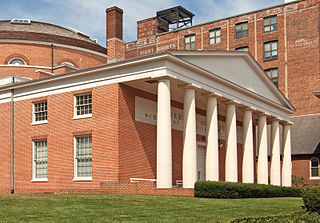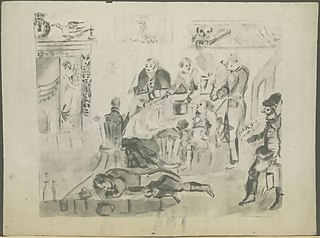
A Juris Doctor, Doctor of Jurisprudence, or Doctor of Law (JD) is a graduate-entry professional degree that primarily prepares individuals to practice law. In the United States, it is the only qualifying law degree. Other jurisdictions, such as Australia, Canada, and Hong Kong, offer both the postgraduate JD degree as well as the undergraduate LL.B., BCL, or other qualifying law degree depending on the requirements of the jurisdiction where the person will practice law.

A law school in the United States is an educational institution where students obtain a professional education in law after first obtaining an undergraduate degree.

The Commentaries on the Laws of England are an influential 18th-century treatise on the common law of England by Sir William Blackstone, originally published by the Clarendon Press at Oxford between 1765 and 1769. The work is divided into four volumes, on the rights of persons, the rights of things, of private wrongs and of public wrongs.

The University of Maryland, Baltimore (UMB) is a public university in Baltimore, Maryland. Founded in 1807, it is the second oldest college in Maryland and comprises some of the oldest professional schools of dentistry, law, medicine, pharmacy, social work and nursing in the United States. It is the original campus of the University System of Maryland and has a strategic partnership with the University of Maryland, College Park. Located on 71 acres (0.29 km2) on the west side of downtown Baltimore, it is part of the University System of Maryland.
The University of Maryland Francis King Carey School of Law is the law school of the University of Maryland, Baltimore and is located in Baltimore, Maryland. Founded in 1816, it is one of the oldest law schools in the United States.
Professional responsibility is a set of duties within the concept of professional ethics for those who exercise a unique set of knowledge and skill as professionals.

James Alfred Pearce was an American politician. He was a member of the U.S. House of Representatives, representing the second district of Maryland from 1835 to 1839 and 1841 to 1843. He later served as a U.S. Senator from Maryland from 1843 until his death in 1862.
The New York State Bar Association (NYSBA) is a voluntary bar association for the state of New York. The mission of the association is to cultivate the science of jurisprudence; promote reform in the law; facilitate the administration of justice; and elevate the standards of integrity, honor, professional skill, and courtesy in the legal profession.

Mark Hopkins was an American educator and Congregationalist theologian, president of Williams College from 1836 to 1872. An epigram — widely attributed to President James A. Garfield, a student of Hopkins — defined an ideal college as "Mark Hopkins on one end of a log and a student on the other."
Reading law was the primary method used in common law countries, particularly the United States, for people to prepare for and enter the legal profession before the advent of law schools. It consisted of an extended internship or apprenticeship under the tutelage or mentoring of an experienced lawyer. The practice largely died out in the early 20th century. A few U.S. states, namely California, Maine, New York, Vermont, Virginia and Washington, still permit people to become lawyers by reading law instead of attending some or all of law school, although the practice is rare.

Deborah Lynn Rhode was an American jurist. She was the Ernest W. McFarland Professor of Law at Stanford Law School and the nation's most frequently cited scholar in legal ethics. From her early days at Yale Law School, her work revolved around questions of injustice in the practice of law and the challenges of identifying and redressing it. Rhode founded and led several research centers at Stanford devoted to these issues, including its Center on the Legal Profession, Center on Ethics and Program in Law and Social Entrepreneurship; she also led the Michelle R. Clayman Institute for Gender Research at Stanford. She coined the term "The 'No-Problem' Problem".

Maynard E. Pirsig, LLD, was an American legal scholar. He was a professor, and dean, of the University of Minnesota Law School; a Minnesota Supreme Court justice; director of the Minnesota Legal Aid Society, and an advisor for the Indonesian, Puerto Rican, and El Salvadoran legal systems. He defined Legal Ethics in the 1974 Encyclopedia Britannica. His law books were widely used in schools across the country, including his casebook Judicial Administration--which Pirsig used for the United States' first law reform course, early 1930s. He was mentored by Everett Fraser, Roscoe Pound, and Felix Frankfurter.
John Gage Marvin (1815–1855) was an American lawyer, legal bibliographer and figure in the history of California.
A Short View of Legal Bibliography is a book by Richard W. Bridgman. It was first published in 1807.
Legal bibliography is the bibliography of law. The term has been applied to "the kinds and functions of legal materials" and to "lists of law books and related materials".
This list is a legal bibliography.
A Digest of the Laws of England, also known as Comyns' Digest, is a book by Sir John Comyns. The latest English edition was published in 1822. A 120-page, handwritten tabulation by John Neal in 1826 of all cases in the digest is included with the Jeremy Bentham papers at the University College London.
Legal biography is the biography of persons relevant to law. In a preface dated October 1983, A. W. B. Simpson wrote that it was "a rather neglected field". Since then there has been a "resurgence of interest".

David Hoffman was an American legal scholar. He taught law at the University of Maryland from 1814 to 1843. Hoffman wrote Hoffman's Course of Legal Study, an influential early legal textbook.

The Delphian Club was an early American literary club active between 1816 and 1825. The focal point of Baltimore's literary community, Delphians like John Neal were prodigious authors and editors. The group of mostly lawyers and doctors gathered weekly to share refreshments and facetious stories, with many of their works being published in The Portico magazine. The club's structure and terminology were inspired by classical antiquity and comical verbosity. Sixteen men claimed membership over the club's nine-year run, with no more than nine serving at a time. Edgar Allan Poe satirized the group in his unpublished Tales of the Folio Club in the 1830s.










